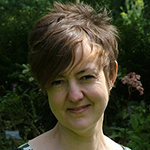Cost: Free
Book a place
Overview
Aphasia is a language disorder commonly caused by stroke that affects speaking, listening, reading and writing, and as a result everyday conversations can become difficult.
Better Conversations with Aphasia is a free e-learning resource to improve access to conversation therapy for:
- speech and language therapists/pathologists (SLTs)
- people with aphasia and their families
- healthcare workers and medics who deal with people with aphasia
Video and audio materials are at the heart of the resource.
This resource was developed by staff at UCL's Division of Psychology and Language Sciences (PaLS).
Content
You'll learn a variety of things depending on your interests and professional background.
Speech and language therapists will:
- learn how to do conversation therapy
- have access to a complete therapy programme, interactive learning materials, and advice from experienced clinicians
People with aphasia and their families will:
- find out what conversation therapy is
- find out what other people with aphasia think of conversation therapy
- be able to reflect on whether it is right for them
Healthcare workers and medics who deal with people with aphasia and their family members will:
- learn how aphasia affects everyday conversation
- learn what conversation therapy is, and the evidence base for its efficacy
Material that is aphasia-friendly is marked with an 'aphasia' icon so you can find it easily.
Eligibility
You need to be a speech and language therapist (pathologist) (SLT) or SLT student to make use of the therapy programme and related interactive learning materials.
You do not need to know about conversation, conversation therapy or conversation analysis.
If you have aphasia or a family member does, you don't need any prior knowledge of conversation therapy, but a basic understanding of aphasia would be helpful.
If you are a healthcare worker or a medic, you need to have a basic understanding of aphasia.
Please note that this resource will not give you the necessary knowledge or skill to carry out conversation therapy unless you are already a qualified speech and language therapist (pathologist).
Learning outcomes
There are several ways you can use this resource. You'll have different learning outcomes depending on how you use it.
If you're an SLT or SLT student you can use it:
- for short periods of continuing professional development (note: the resource is not designed for you to work through from beginning to end in one sitting)
- to support you to plan, carry out and measure outcomes of conversation therapy with your clients
- to work through with your clients during therapy
- to train medics/healthcare professionals about aphasia and its impact on conversation skills
For suggested 'packages' of modules to use for different purposes, see the 'how to use BCA' guides within the resource.
If you're a person with aphasia, or if your family member has aphasia, you can use it to find out:
- what conversation therapy is
- what other people with aphasia think about it
- whether it is right for you
- other places to go for support and advice about aphasia and conversation.
For advice about how to use the materials, see the aphasia-friendly 'how to use BCA' guides within the resource.
If you're a healthcare worker or medic, you can use it to find out:
- how aphasia affects everyday conversation
- what conversation therapy is
- the evidence base for its efficacy.
For advice about how to use the materials, see the 'how to use BCA' guides within the resource.
How to reference this resource
Please reference this resource as follows:
Beeke S, Sirman N, Beckley F, Maxim J, Edwards S, Swinburn K, Best W. 2013. Better Conversations with Aphasia: an e-learning resource. Available at: https://extend.ucl.ac.uk/
Better Conversations with Aphasia on social media
- Twitter: @BCAphasia
Course team

Suzanne Beeke
Suzanne is a speech and language therapist (SLT) and senior lecturer at UCL. Her research expertise lies in using Conversation Analysis to assess and treat people with aphasia, and she led the Better Conversations with Aphasia project.
Nicola Sirman
Nicola is an SLT and research assistant on the Better Conversations with Aphasia project. She has worked with adults with acquired neurological conditions and adult dysfluency since qualifying in 2009.

Firle Beckley
Firle is an SLT with over 10 years experience of working in the NHS. She's currently a Stroke Association Junior Research Training Fellow studying for a PhD at UCL. She was the research associate on the Better Conversations with Aphasia project.
Jane Maxim
Jane is an SLT and Emeritus Professor of Human Communication Science at UCL. She was part of the research team who devised the SPPARC conversation training programme (Lock, Wilkinson & Bryan, 2001).
Susan Edwards
Susan is an SLT and has experience of educating SLTs. She's Emeritus Professor at the University of Reading and Visiting Professor at UCL. She's carried out extensive research and has clinical experience in the fields of language disorders in children and adults.

Kate Swinburn
Kate is an independent consultant in health, research and policy, with experience of working alongside people with aphasia as research collaborators. She represented Connect, the communication disability network, on the Better Conversations with Aphasia project.

Wendy Best
Wendy is an SLT and Professor of Communication Science and Language Therapy at UCL. She has expertise in intervention research and a particular interest in linking research and clinical practice.
Book a place
Course information last modified: 30 Nov 2022, 15:59
 Close
Close

